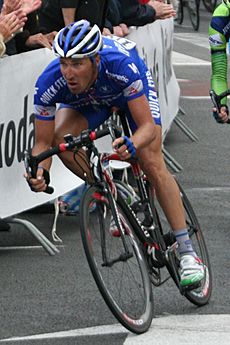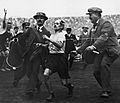Exercise physiology facts for kids
Exercise physiology is a cool science that studies how your body changes when you exercise. It looks at what happens right away when you run or jump. It also studies how your body gets stronger and healthier over time if you exercise regularly.
This field also explores how exercise can help people who are sick. It investigates how being active can make diseases less severe or even help people get better. Experts in this area make sure that education programs are good and consistent.
Contents
What is Exercise Physiology?
Exercise physiology is the science that explores how your body reacts to physical activity. It studies both the immediate changes and the long-term changes that happen when you move your body.
- Immediate changes (called acute responses): These are things like your heart beating faster or you breathing harder when you start running.
- Long-term changes (called chronic adaptations): These are changes that happen over time, like your muscles getting stronger or your heart becoming more efficient after weeks of training.
Exercise physiologists also look at how exercise affects health problems. They study how being active can help prevent or even improve many diseases.
What Exercise Physiologists Study
People who study exercise physiology learn about many different parts of the human body and how they work together during exercise. Their studies can include:
- Biochemistry: How chemicals in your body change and react during exercise.
- Bioenergetics: How your body creates and uses energy for movement.
- Cardiopulmonary function: How your heart and lungs work together to deliver oxygen to your muscles.
- Hematology: The study of your blood and how it changes with exercise.
- Biomechanics: How your body moves and the forces involved in movement.
- Skeletal muscle physiology: How your muscles work, grow, and get stronger.
- Neuroendocrine function: How your brain, nerves, and hormones control your body's response to exercise.
- Nervous system function: How your brain and nerves send signals to your muscles to make them move.
Who Are Exercise Physiologists?
Exercise physiologists can have many different jobs. Some are basic scientists who do research in labs to understand how the body works. Others are clinical researchers who study how exercise can help people with health conditions.
Some exercise physiologists work directly with people as clinicians, helping them use exercise to improve their health. Many also work as sports trainers, helping athletes get stronger and perform better.
Images for kids
See also
 In Spanish: Fisiología del ejercicio para niños
In Spanish: Fisiología del ejercicio para niños




